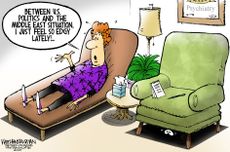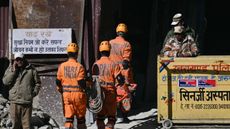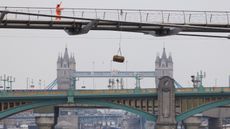Nationwide strikes bring France to standstill
Police fire teargas as protesters challenge Macron’s economic reforms

Thousands of French public sector workers took to the streets yesterday as part of a nationwide strike in protest at Emmanuel Macron’s planned public sector reforms.
Train drivers, teachers, nurses and air traffic controllers held more than 150 marches in towns and cities across France. Most were peaceful, although there were reports of police scuffling with protesters in Paris and firing tear gas and water cannon at demonstrators in the western city of Nantes.
The walk-out meant 60% of fast trains, 75% of intercity trains and 30% of flights to and from Paris airports had to be cancelled. Around 13% of teachers walked off the job, forcing the closure of a large number of primary schools.
Subscribe to The Week
Escape your echo chamber. Get the facts behind the news, plus analysis from multiple perspectives.

Sign up for The Week's Free Newsletters
From our morning news briefing to a weekly Good News Newsletter, get the best of The Week delivered directly to your inbox.
From our morning news briefing to a weekly Good News Newsletter, get the best of The Week delivered directly to your inbox.
There are two different sets of grievances behind the strike day, “both of which have the potential to cause a headache for the French government”, says The Guardian.
France’s 5.4 million state workers are angry over plans to cut the public sector by 120,000 workers by 2022, with unions accusing Macron of seeking to dismantle the state sector, and about the introduction of merit-based pay.
The coordinated day of action is the first widespread strike seen in France since President Macron came to power just under a year ago, on a promise to reform the country’s bloated public sector and shake up its antiquated labour laws.
However, “opinion polls show a paradox” says Reuters: a majority of voters back the strike but an even bigger majority back the reforms, including cutting the number of public sector workers and introducing merit-based pay.
“That has led the government, which overhauled labour laws last year and is crafting a series of other reforms to unemployment insurance and training, to say it will stand by its plans, while keeping a close eye on protests,” reports the news agency.
The danger, says CNN, “will come in the longer term if unions are able to persuade their members to stay home for longer, which could lead to wider economic repercussions”.
Create an account with the same email registered to your subscription to unlock access.
Sign up for Today's Best Articles in your inbox
A free daily email with the biggest news stories of the day – and the best features from TheWeek.com
-
 'A direct, protracted war with Israel is not something Iran is equipped to fight'
'A direct, protracted war with Israel is not something Iran is equipped to fight'Instant Opinion Opinion, comment and editorials of the day
By Harold Maass, The Week US Published
-
 Today's political cartoons - April 17, 2024
Today's political cartoons - April 17, 2024Cartoons Wednesday's cartoons - political anxiety, jury sorting hat, and more
By The Week US Published
-
 Arid Gulf states hit with year's worth of rain
Arid Gulf states hit with year's worth of rainSpeed Read The historic flooding in Dubai is tied to climate change
By Peter Weber, The Week US Published
-
 Bizarre pizza toppings horrify Italians
Bizarre pizza toppings horrify ItaliansTall Tales And other stories from the stranger side of life
By Chas Newkey-Burden, The Week UK Published
-
 Puffed rice and yoga: inside the collapsed tunnel where Indian workers await rescue
Puffed rice and yoga: inside the collapsed tunnel where Indian workers await rescueSpeed Read Workers trapped in collapsed tunnel are suffering from dysentery and anxiety over their rescue
By Sorcha Bradley, The Week UK Published
-
 Despairing husband creates 'Taylor Swift jar'
Despairing husband creates 'Taylor Swift jar'Tall Tales And other stories from the stranger side of life
By Chas Newkey-Burden, The Week UK Published
-
 Gaza hospital blast: What the video evidence shows about who's to blame
Gaza hospital blast: What the video evidence shows about who's to blameSpeed Read Nobody wants to take responsibility for the deadly explosion in the courtyard of Gaza's al-Ahli Hospital. Roll the tape.
By Peter Weber, The Week US Published
-
 Why a bale of straw is hanging from a London bridge
Why a bale of straw is hanging from a London bridgeTall Tales And other stories from the stranger side of life
By Chas Newkey-Burden, The Week UK Published
-
 Giraffe poo seized after woman wanted to use it to make a necklace
Giraffe poo seized after woman wanted to use it to make a necklaceTall Tales And other stories from the stranger side of life
By Chas Newkey-Burden, The Week UK Published
-
 Helicopter sound arouses crocodiles
Helicopter sound arouses crocodilesTall Tales And other stories from the stranger side of life
By Chas Newkey-Burden, The Week UK Published
-
 Woman sues Disney over 'injurious wedgie'
Woman sues Disney over 'injurious wedgie'Tall Tales And other stories from the stranger side of life
By Chas Newkey-Burden, The Week UK Published